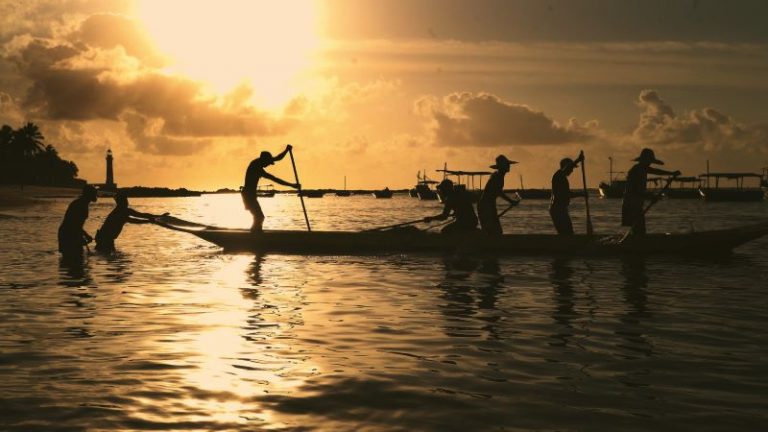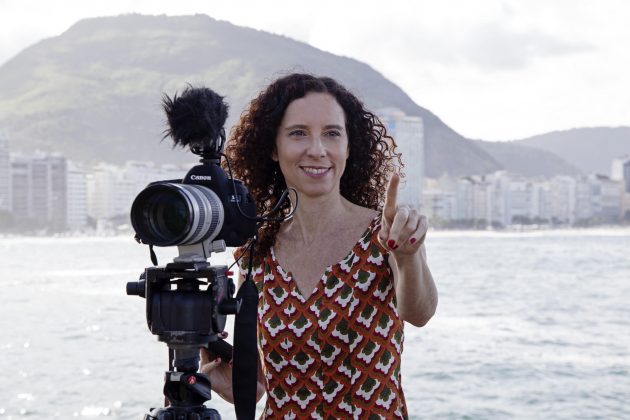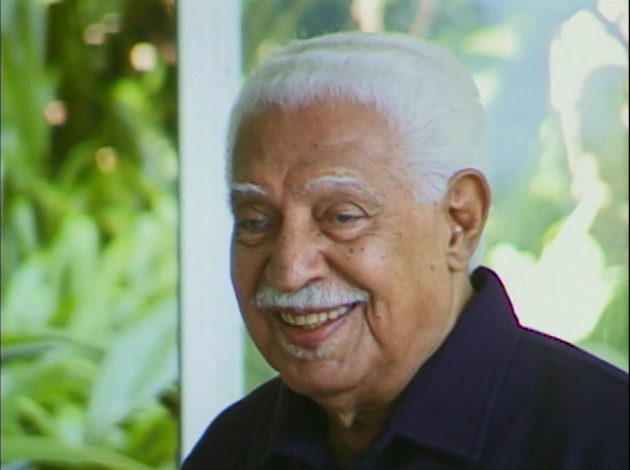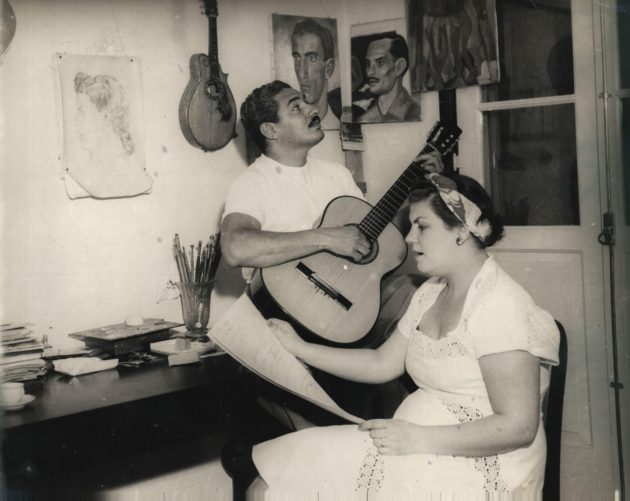
In Conversation with Daniela Broitman, Director of ‘Dorival Caymmi – The Sounds of Life’
29 January, 2021Dorival Caymmi – The Sounds of Life (Brazil, 2019, dir. Daniela Broitman), a documentary about one of Brazil’s great twentieth-century musicians, is being shown on virtualWOMEX, an “online gateway to the global music community”.
Dorival Caymmi was a composer, singer and songwriter, whose work became associated with his origins in the Brazilian state of Bahia; Bahia’s landscape and way of living inspired many of the songs which made him famous.
Lots could and must be said about Dorival Caymmi, but most famously, he is the composer of Carmen Miranda’s smash hit O Que é Que a Baiana Tem?, the samba which he made in 1939, the same year in which Miranda sang it in the film Banana da Terra, directed by Ruy Costa. In 2009, 80 years after the song came out, Miranda’s recording was selected for preservation in the Library of Congress in the USA – proof of Caymmi’s international legacy.
Amongst other delightful anecdotes, the film tells us that it was Caymmi himself who taught Miranda the hand and eye movements that she did when she performed the famous song about a woman from Bahia. We have the joy of seeing Caymmi himself talking about his creative process and telling some of these stories in a never-before-seen interview made in 1998, twenty years before his passing at 94 years of age. He not only left a meaningful body of work, but also three children who have themselves become great exponents of Brazilian music: Nana, Dori and Danilo Caymmi. All of them were interviewed for the film and help us understand more about the artist and man that Caymmi was in this moving documentary about a highly sensitive man who was not above having human flaws.
Sounds and Colours had the opportunity to speak to the director, documentary-maker Daniela Broitman. Broitman spoke about how Caymmi “revolutionised Brazilian song-writing and influenced generations of musicians, paving the way for movements such as Bossa Nova and Tropicália.”
Dorival Caymmi – The Sounds of Life can be watched on virtualWOMEX until Sunday 31 January.
The documentary is based mainly on an interview given by Dorival Caymmi in 1998, 10 years before his death. What was your first encounter with Caymmi’s work?
I remember my maternal grandmother singing Caymmi songs when I was a kid. She had a beautiful, deep, velvety voice. In fact, now 95, she still has it. Who knew that a few decades later, I would receive a proposal to produce a film about Caymmi?! I agreed to produce the film immediately. What I didn’t know at the time is that I would end up directing and writing the script as well. I ended up taking a deep dive into Caymmi’s universe.
How did you come across the archive material used in the film?
It was an intense piece of research, which was also the result of my desire to get to know Dorival Caymmi deeply. I wanted the material to be almost entirely new and not to have a TV show format. I went to public libraries, TV stations, I spoke with family members, friends… In short, it was a work of journalistic investigation undertaken with the curiosity that has always accompanied me, ever since I started my career as a reporter at the age of 19 at Folha de São Paulo [one of the most important newspapers in Brazil].

How did you decide to base the film mainly on an interview from 1998?
Some TV stations had interesting material with Caymmi, but they had been shown before and most had that TV format with interviewers, a lot of zoom, frames and cuts with transitions, which wasn’t what I was looking for. The interview which is in the film had never been exhibited, so it met one of my main requirements. It was also raw material. Its resolution was low because the [original] film was lost and we had to use tapes recorded 20 years ago, so it took a lot of post-production work. I think that, as much as possible within what could be done, our team did a great job, both in the editing and correction of images, audio and everything else. Despite the low resolution of the material, Caymmi’s testimonies touched me deeply from the first time I watched it. Certainly, the fact that he was interviewed at the home of one of his best friends, Marcelo Machado, who sometimes told an anecdote or hummed his songs, helped Caymmi a lot to feel at ease and gave a lightness to the interview atmosphere. You can see the affection in every word Caymmi says. His love of Bahia, Rio, friends, Stella (his wife), family, music, Tom Jobim, poetry, art, himself, and especially life.

Your first documentary was about the musician and social activist Marcelo Yuka, a contemporary musician who was first known for his work with the band O Rappa, which emerged in the 90s with a very peculiar fusion of rhythms such as rock, hip hop, funk, reggae and samba. What is the difference between making a documentary about a living musician and someone who died over a decade ago?
I thought about this a lot during the production of this film. It was the first time that I made a film about someone who was no longer there to answer my questions. I think that’s why I felt I had to do so much research on Caymmi. I had to get to know him so well that I could answer all my own questions about him. We must also remember that there is always the family of the one who’s passed away, which can both help and hinder. If, on the one hand, it was more difficult not to have him around, not to be able to film him in situations that I wanted, or to ask the questions that I would have liked, on the other hand, it was much more peaceful – I didn’t feel that pressure that we usually do when the protagonist is around all the time.
I was very close to Marcelo Yuka. In fact, Marcelo certainly let me make the film because he knew me well. He was very aloof and suspicious, he needed to trust [someone] a lot to let himself be portrayed. One of the reasons he agreed to make the film was because he wanted to show the medical advances in stem cell treatments so that people like him (wheelchair users) could walk again. But the point is that, for some reasons that are explained in the film Marcelo Yuka no Caminho das Setas, it didn’t work. And that made him very upset, to the point of wanting to give up making the film. But I had been filming it for about five years. Can you imagine giving up after so much time, money, motivation and plans invested? I even filmed at the end of the documentary with Marcelo ignoring me. It made me feel really bad, but I thought I had a mission to finish that film. We did not speak for a few months, which saddened me a lot at the time. But about a year after the film was released, Marcelo came to thank me, which touched me deeply.
It is worth mentioning that Marcelo Yuka and Dorival Caymmi have something in common that caught my eyes right away: both were brilliant and complete artists; both acted on several fronts; both had a loving and generous worldview. I believe that if Marcelo were alive until Caymmi’s age [Yuka passed away at 53 and Caymmi at 94], they would have much more in common.
From Yuka’s contemporary work to Caymmi’s already eternal work, how did this reverse path in the history of Brazilian music happen for you as a director?
It was very interesting to get out of this immersion on the fusion of rock, hip hop, funk, samba and reggae of O Rappa, passing by Yuka’s brilliant lyrics with [the band] F.UR.TO, with their electronic, dub and rap sounds, and then through all his contemporary experiments with his incredible producer Apollo 9 in [the album] Canções para Depois do Ódio to enter the Caymmian universe. A very unusual path to say the least, right? But it had everything to do with my own personal history and evolution.
I remember when Marcelo said that he had understood that he had to stop fighting, to stop learning through the pain and to start learning through love. That is why his last album is called Canções para Depois do Ódio [in English, ‘Songs for After Hatred’]. At the time I thought what he said was beautiful but I couldn’t envision it happening in my life. Learning through love and not pain? I lost my father at 17 due to a medical error. Then my father’s partners stole everything we had, with the help of our lawyer. As soon as I could I left Brazil – I was away for six years. I did my master’s at Berkeley, and when I came back I only thought I had to fight to survive. I fought for social justice, for human rights, for equality. Marcelo and I had these fights in common, which united us. We had this revolt as the creative force of our art. After many years I understood that this should not be a fight – in a fight you are against something, against someone. It should be a pursuit.
And the most important pursuit of all is self-knowledge because there is no way to improve the world if we do not evolve internally. It sounds cliché, but it is real. How much time a day do people take to think about what they want to accomplish in the long run? We also build our reality with our thoughts, our intentions. For this reason, it makes perfect sense that precisely at this stage in my life I entered the universe of Dorival Caymmi. He, more than anyone, had a real understanding of the importance of spirituality in our lives. And I’m not talking about religion – he was also very religious – but they are different things. I mean his spiritual pursuit. His connection with the sea, with Yemanjá, with the wind, with the stones, his intuition, his connection with nature – all this reveals [that there was] spirituality in everything he did and [that he had] a very clear understanding of who he was and his purpose in life.
Marcelo was also on that pursuit, in Marcelo Yuka no Caminho das Setas there is even a scene in which he talks about meditation and another one of him doing yoga. We talked a lot about these subjects. Perhaps these things and the love of several art forms unite Marcelo Yuka and Dorival Caymmi – and unites me to them.
What is the importance of talking about Dorival Caymmi and his work in today’s Brazil?
We live in a time when there is a complete inversion of values and concepts. Artists have come to be seen as ‘vagabonds’ who depend on the government. Most artists work much more than many professionals in other fields. Most without guaranteed salaries at the end of the month, no nine to five job, no bank holidays, no vacation. Several sectors and industries need tax incentives to grow, why couldn’t the audio-visual sector receive them too, for example?
Culture and art are seen today by a good part of society as something expendable, and what these people do not realise is that they live culture and breathe art for a large part of their day: during their entire leisure time, or even on a journey to work, or while waiting in a doctor’s office. Imagine the world without art, without culture, can you imagine people’s despair?! So, imagine Brazil without [artists from Bahia] Dorival Caymmi, João Gilberto, Caetano [Veloso], [Gilberto] Gil, Gal [Costa] and [Maria] Bethânia?

Caymmi revealed Bahia to the world in the voice of Carmen Miranda; he contributed to making Brazilian music known worldwide. He revolutionized Brazilian song-writing and influenced generations of musicians, paving the way for movements such as Bossa Nova and Tropicália. He is the symbol of a powerful, diverse, creative, exuberant, sensual, avant-garde, charismatic and affectionate Brazil. It is the image that I want to convey about our country, which has suffered a lot with so much political greed. I want Brazil to be remembered again for all this beauty and cultural richness, and I hope that Dorival Caymmi – The Sounds of Life will be able to show this.
Dorival Caymmi – The Sounds of Life can be watched on virtualWOMEX until Sunday 31 January.
Follow Sounds and Colours: Facebook / Twitter / Instagram / Mixcloud / Soundcloud / Bandcamp
Subscribe to the Sounds and Colours Newsletter for regular updates, news and competitions bringing the best of Latin American culture direct to your Inbox.

